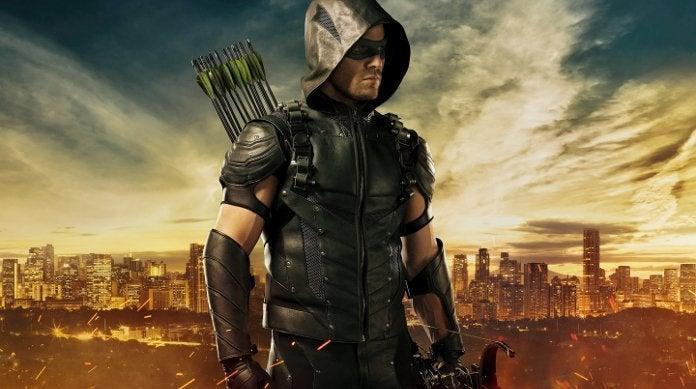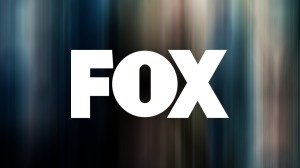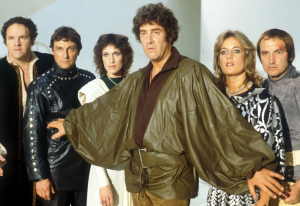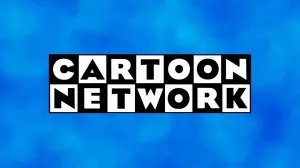Earlier this week, Arrow star Stephen Amell sat in on a wrestling podcast to promote Heels, his Starz drama which just hit Netflix. Both Amell and showrunner Mike O’Malley have both been pretty open about their hopes that Netflix will help Heels find a new, larger audience, and that it could lead to additional episodes being greenlit, so expect to see a lot of the star out there on the internet this week and next. Along the way, Amell vented a little bit about the way Peacemaker fired shots at Green Arrow. While the show was taking aim at the character – something it also did with DC Extended Universe characters like Aquaman and Wonder Woman – Amell also felt like Arrow itself was being disrespected.
Videos by ComicBook.com
“Between the movies and Peacemaker a little bit, our show was kind of treated like s—t,” Amell told Chris Van Vliet on YouTube. “I get it, we’re on The CW, I get it, it’s TV. But I also get the fact that when people think about the most recent iteration of DC, they don’t think about the Snyder Cut – they think about the Arrowverse. We got crapped on for years, and years, and years, and this just seemed excessive.
Here’s the thing: Amell is right. The Arrowverse gets a lot of grief for being low-budget and for dipping into the tropes common to network TV shows, and it doesn’t get nearly enough credit for the way it brought the DC Universe to life in live-action.

The Arrowverse was the fans’ colloquial name for a shared DC Universe of live-action TV series. Arrow was the first, followed by The Flash, Supergirl, DC’s Legends of Tomorrow, Black Lightning, and Batwoman. Superman & Lois spun out of the events of 2020’s Crisis on Infinite Earths event series, becoming the final show set in the multiverse established on Arrow.
Some readers are seeing Amell’s comments as sour grapes, and it’s easy to understand why – he’s complaining about the unfair treatment that his show got…but it ran for eight seasons and ended on his terms. Still, that’s a pretty uncharitable characterization. It isn’t as though he only comments on this kind of thing when it affects him personally, after all.
One famous example was the way he stepped up to defend Grant Gustin and the cast and crew of The Flash in 2014. The series debuted on October 7th and managed the biggest premiere audience The CW had enjoyed in years. The Flash was an immediate smash hit, and there was a lot of reason to be excited. On October 15th, Warner Bros. announced a new film slate, which included a The Flash movie starring Ezra Miller.That meant not only was the Arrowverse not going to be tied to the then-upcoming DC Extended Universe, but the cast of The Flash would be asked in every interview about the movie plans.
Amell criticized the announcement’s timing, saying that it felt like it undercut The Flash and star Gustin almost immediately after the show’s debut, and robbed the cast and crew of a celebratory moment.
“I thought that it was shitty that all of this stuff got announced the morning of the spectacular ratings of the second episodes of The Flash came in,” Amell said at the time. “I thought that the way that Warner Bros. announced the slate of DC movies could have been handled better, and I think that someone like Grant Gustin, who has just launched an iconic character like the Flash, to record breaking numbers…I think that he should have been given a wider berth than two episodes before another actor was announced to play his character. That’s because I’m protective of Grant. And that’s because I think that producing 23 episodes of superhero television is more difficult than producing a feature film. And it’s 23 episodes again, and again, and again.”
That’s something that came up when Amell was defending the honor of the Arrowverse: the kind of turnaround and endurance it takes to make these things work.
“I’m working just as hard as anyone else,” Amell said in the Heels interview. “Do you know how hard it is to play a superhero with no superpowers for 23 episodes a year? It’s really, really, really hard, and I’m not looking for a prize, but, like, maybe don’t s–t on our show.”

The Arrowverse is the biggest shared superhero universe ever to make its way to live action — both in terms of the numbers of characters and stories adapted, and also the number of actual storytelling hours — and told a sprawling, interconnected story for more than a decade, watched by tens of millions of fans.
To date – not counting the upcoming, final season of Superman & Lois – the entirety of the Arrowverse spans 34,047 minutes (more than 567 hours). For comparison, the entire Marvel Cinematic Universe (including its TV series) takes place over less than 8,000 minutes. When it comes to live-action interpretations of mainstream American superheroes, the Arrowverse is the longest and most elaborate shared universe by a wide margin.
That means that for millions of fans, the Arrowverse is a definitive version of the DC multiverse. There are legitimate criticisms to be made about elements of the execution, but the reality is, the audience for The CW’s superhero shows were passionate, vocal, engaged on social media. The Arrowverse exposed casual viewers to deep-cut characters who would have otherwise had virtually no legitimate chance of being adapted to live-action — and it did so while spending a fraction of the cost of even a single feature film.
That also means that hundreds of people at all levels of production put in tens of thousands of hours’ work to bringing the shows to life — often while working under punishing conditions. Long shoots, night shoots, and filming in Vancouver for tax reasons all combine to create a scenario where many of these actors were standing outside in frigid temperatures for hours at a time to make the series. Tight budgets and a weekly network TV deadline means stunt teams and visual effects teams were both trying to work miracles with relatively little support.
Amell’s comment that audiences don’t think of Zack Snyder’s Justice League when they think of DC, but rather the Arrowverse, doesn’t seem so crazy in that context. Several of the Arrowverse shows continue to thrive on streaming now, even after the franchise wrapped up for good.
Whether it’s fair for Amell to take the Peacemaker jab personally or not — after all, that show basically made fun of all of DC’s big guns — he’s right to be frustrated about the way the Arrowverse was criticized during its run and has been talked about frequently since. When Mr. Terrific, a regular on Arrow, ended up in the new Superman movie, the issue of “CW costumes” came up. That ignored the fact that many of the Arrowverse’s costumes were designed by Academy Award winner Colleen Atwood, whose resume also includes Chicago, Top Gun: Maverick, and Beetlejuice Beetlejuice.
Arrowverse maestro Greg Berlanti, meanwhile, is one of the most celebrated producers of the last 20 years. At one point, he had more shows on TV than any other producer in history, and he recently won the Emmys’ Governor’s Award. That wasn’t just for the Arrowverse — Berlanti also worked on projects ranging from Dawon’s Creek and Everwood to Red, White, and Royal Blue — but it’s hard to argue the decade-plus he spent working on DC superheroes won’t be one of the main things Berlanti is remembered for.
At the end of the day, the various shows of the Arrowverse may not be as polished as a $200 million feature film — but they made characters like The Flash and Supergirl household names while also introducing casual fans to Green Arrow, Black Lightning, The Atom, and other heroes who might not ever have found themselves represented in live action otherwise. Amell is right that, given their success and longevity, these shows deserve to be more than the butt (heh) of the joke.








